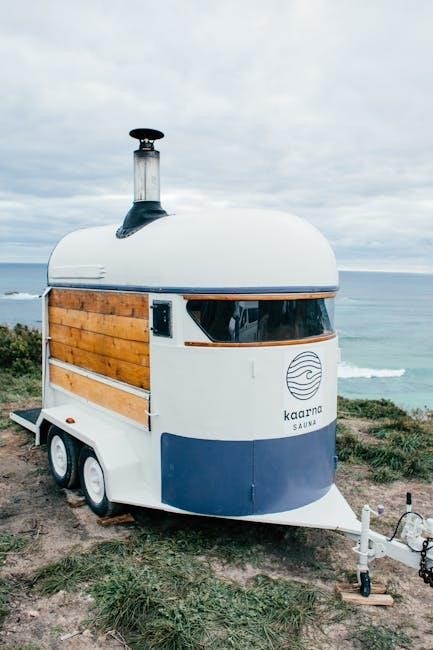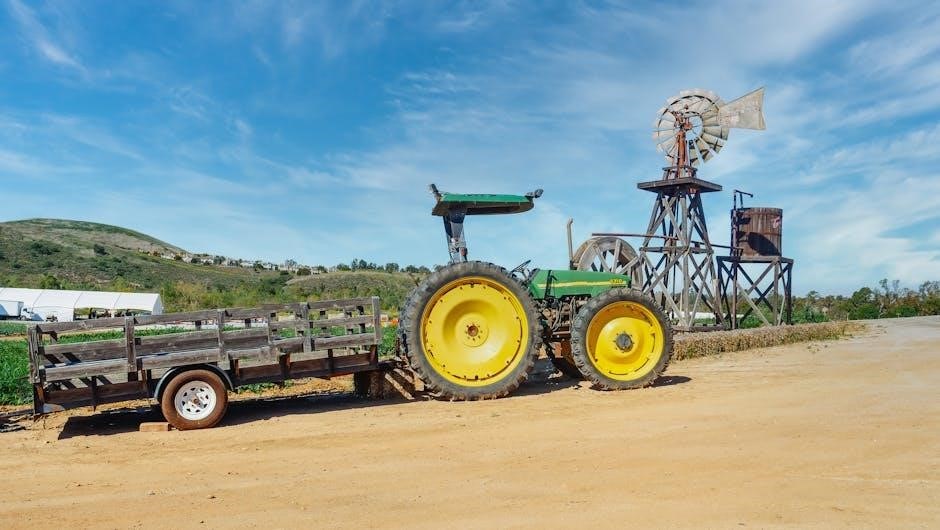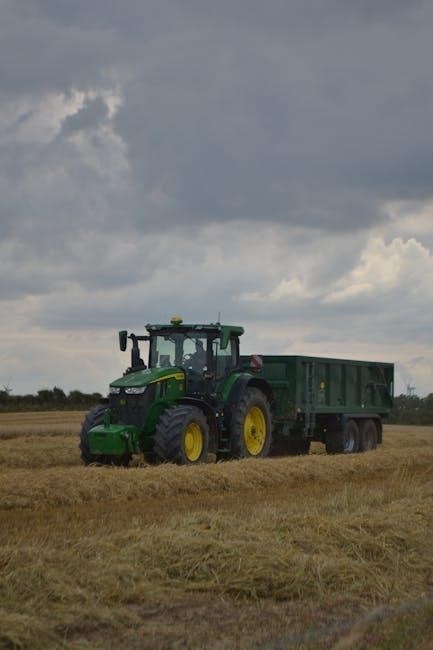The Trailer Life Tow Guide is a comprehensive resource for understanding towing capacity, vehicle specifications, and safe towing practices, updated annually for accuracy and relevance.
Overview of Trailer Life Tow Guide
The Trailer Life Tow Guide is a detailed annual publication providing essential information for RV enthusiasts and those needing to tow trailers safely. It includes vehicle specifications, towing capacities, and setup guidelines to ensure safe and efficient towing. The guide covers various factors influencing tow ratings, such as engine type, transmission, and drive configuration. It also provides weight ratings, including GVWR and UVW, to help users make informed decisions. Additionally, the guide offers insights into hitch setups, weight distribution, and maintenance tips. Available in digital formats, it serves as a trusted resource for selecting the right tow vehicle and trailer combination, ensuring compliance with safety standards and legal requirements. Its comprehensive coverage makes it a go-to reference for both novices and experienced tower operators.
Importance of Towing Guides for Safe Trailer Operation
Towing guides like the Trailer Life Tow Guide are essential for ensuring safe and legal trailer operation. They provide critical information on towing capacity, weight ratings, and proper setup, helping users avoid accidents and damage. By adhering to the guidelines, drivers can maintain control and stability while towing, reducing risks on the road. The guide also helps drivers understand complex specifications, such as GVWR and UVW, ensuring vehicles and trailers are used within safe limits. Additionally, it highlights legal requirements, preventing potential fines or insurance issues. Using a towing guide empowers drivers to make informed decisions, promoting confidence and safety during towing operations, especially in emergencies or challenging conditions.
Key Factors in Determining Towing Capacity
Determining towing capacity involves evaluating several critical factors, including the vehicle’s Gross Vehicle Weight Rating (GVWR), engine power, transmission type, and axle ratio. The Trailer Life Tow Guide emphasizes that understanding these elements ensures safe and efficient towing. The vehicle’s weight distribution, suspension strength, and braking system also play significant roles. Additionally, the trailer’s weight, including its cargo and tongue weight, must be considered to avoid exceeding the vehicle’s limits. Proper hitch setup and the use of weight-distributing systems can further enhance towing stability. By carefully assessing these factors, drivers can ensure their towing setup operates within safe parameters, preventing potential hazards and maintaining control on the road.

Understanding Towing Capacity
Towing capacity refers to the maximum weight a vehicle can safely tow, determined by its GVWR, engine power, and other specifications. Trailer Life Tow Guide provides detailed ratings to help users understand these limits for safe and efficient towing.
What is Towing Capacity and Why is it Important?
Towing capacity is the maximum weight a vehicle can safely tow, determined by its Gross Vehicle Weight Rating (GVWR), engine power, and transmission type. It is crucial for ensuring safe and efficient towing operations. Exceeding this limit can lead to loss of control, vehicle damage, or accidents. Trailer Life Tow Guide provides detailed towing capacity ratings for various vehicles, helping users make informed decisions. Understanding towing capacity ensures trailers and cargo are within safe limits, preventing potential hazards and legal issues. Always consult the guide to match your vehicle’s capabilities with your trailer’s weight for a secure towing experience.
Gross Vehicle Weight Rating (GVWR) and Trailer Weight
Gross Vehicle Weight Rating (GVWR) is the maximum weight a vehicle can carry, including its cargo and passengers, as specified by the manufacturer. Trailer weight, including the empty trailer (UVW) and added cargo, must not exceed the vehicle’s GVWR. Exceeding this limit can compromise safety and performance. The Trailer Life Tow Guide emphasizes the importance of calculating GVWR accurately to ensure safe towing. Properly assessing trailer weight and cargo distribution is essential to avoid overload, which can lead to loss of control or equipment failure. Always refer to the GVWR and UVW specifications to maintain safe towing conditions and prevent potential risks on the road.
Understanding UVW, CCC, and GVWR in Trailer Specifications
Understanding trailer specifications like UVW (Unloaded Vehicle Weight), CCC (Cargo Carrying Capacity), and GVWR (Gross Vehicle Weight Rating) is crucial for safe towing. UVW refers to the trailer’s weight without cargo, while CCC is the maximum cargo it can carry. GVWR is the total weight limit, including the trailer and its contents. Exceeding GVWR can lead to unsafe towing conditions. Always consult the manufacturer’s specifications and the Trailer Life Tow Guide to ensure your setup stays within safe limits. Properly calculating these weights ensures your tow vehicle and trailer operate efficiently and safely, avoiding potential risks like overload or equipment failure during transit.

Choosing the Right Tow Vehicle
Selecting the right tow vehicle involves considering engine type, transmission, and drive configuration, as outlined in the Trailer Life Tow Guide, to ensure safe and efficient towing.
Factors to Consider When Selecting a Tow Vehicle
When choosing a tow vehicle, consider engine type, transmission, and drive configuration to ensure sufficient power and control. Towing capacity, as specified by the manufacturer, is critical to avoid overloading. The vehicle’s weight and balance are also key factors, as they affect stability while towing. Additionally, consider the type of hitch required and whether advanced features like trailer braking systems are needed. Consulting resources like the Trailer Life Tow Guide can provide detailed ratings and recommendations for various vehicles, helping you make an informed decision for safe and efficient towing.
Engine and Transmission Types for Towing
Engine and transmission types play a crucial role in determining a vehicle’s towing capability. A robust engine, such as a V8, is often preferred for its torque and durability under heavy loads. Turbocharged engines can also provide sufficient power while maintaining fuel efficiency. Automatic transmissions are commonly recommended for towing due to their smooth power delivery and ease of use, especially when navigating inclines or varying road conditions. Manual transmissions, while less common, can be effective if matched with appropriate gearing. The combination of engine and transmission should align with the intended trailer weight and towing frequency to ensure optimal performance and safety.
Drive Configuration (2WD vs. 4WD) for Towing
Drive configuration significantly impacts towing performance. Two-wheel drive (2WD) systems are suitable for lighter trailers and flat terrain but may lack traction in challenging conditions. Four-wheel drive (4WD) systems provide better control and stability, especially when towing heavier loads or navigating uneven surfaces. For optimal towing, 4WD is recommended, as it distributes power to all wheels, enhancing grip and reducing the risk of wheelspin or loss of control. However, 2WD vehicles can still tow effectively if properly equipped and operated within their weight limits. The choice between 2WD and 4WD should align with the trailer’s weight, terrain, and frequency of use, as outlined in the Trailer Life Tow Guide.

Calculating Trailer Weight and Cargo
The Trailer Life Tow Guide helps calculate trailer weight and cargo by measuring UVW, estimating cargo, and understanding GVWR, ensuring safe and efficient towing for RVs.
How to Measure and Estimate Trailer Weight
Measuring and estimating trailer weight accurately is crucial for safe towing. The Trailer Life Tow Guide recommends starting with the trailer’s GVWR, which includes the UVW and CCC. Check the weight sticker on the trailer for the UVW, then estimate cargo weight by considering items like furniture, appliances, and fluids. Tongue weight, typically 10-15% of the trailer’s total weight, should also be factored in. Use a scale or consult the manufacturer for precise measurements; Accurate weight estimation ensures safe towing, prevents overload, and helps in selecting the right tow vehicle. Always refer to the Trailer Life Tow Guide for detailed instructions and resources to avoid miscalculations.
Calculating Cargo Weight and Its Impact on Towing
Calculating cargo weight is essential for safe towing, as exceeding the trailer’s GVWR can lead to unsafe conditions. The Trailer Life Tow Guide suggests estimating cargo weight by considering all items added to the trailer, such as appliances, furniture, and personal belongings. Subtract the UVW from the GVWR to determine the cargo capacity. Overloading can affect handling, braking, and stability. Use a scale to measure actual weights and adjust loads accordingly. Always ensure the tow vehicle’s capabilities match the combined weight of the trailer and cargo. Proper calculation prevents risks and ensures a secure towing experience, as outlined in the Trailer Life Tow Guide.
Understanding Weight Distribution and Tongue Weight
Weight distribution and tongue weight are critical for stable towing, as outlined in the Trailer Life Tow Guide; Tongue weight refers to the force exerted by the trailer’s tongue on the tow vehicle’s hitch, typically 10-15% of the trailer’s GVWR. Proper distribution ensures even weight across all axles, preventing sway and improving control. A weight-distributing hitch helps balance the load, enhancing safety and performance. Incorrect weight distribution can lead to poor handling or loss of control. Always measure tongue weight using a scale and adjust the trailer’s load to maintain balance. This ensures safe and efficient towing, as detailed in the Trailer Life Tow Guide.

Hitch and Coupler Setup
A proper hitch and coupler setup is essential for safe towing, as detailed in the Trailer Life Tow Guide. Weight-distributing hitches balance trailer weight, while couplers ensure secure connections. Always follow manufacturer guidelines for installation and adjustment to maintain stability and control during towing.
Types of Hitches (Weight-Carrying vs. Weight-Distributing)
Weight-carrying hitches are designed to support the trailer’s tongue weight directly, making them suitable for lighter loads. They are simple to install and require minimal adjustment. Weight-distributing hitches, on the other hand, redistribute the trailer’s tongue weight across the tow vehicle’s axles, improving stability and control, especially for heavier trailers. These hitches are ideal for larger RVs or trailers, as they reduce sway and enhance safety. Choosing the right hitch type depends on the trailer’s weight and the tow vehicle’s capacity. Proper installation and adjustment are critical for both types to ensure safe and efficient towing; Always refer to the Trailer Life Tow Guide for specific recommendations based on your setup.
Choosing the Right Coupler for Your Trailer
Choosing the right coupler for your trailer is essential for safe and secure towing. The coupler must be compatible with your trailer’s tongue weight and hitch type. Weight-carrying and weight-distributing couplers are common options, with the latter offering better stability for heavier loads. Ensure the coupler size matches the ball diameter (1-2 inches) and is rated for your trailer’s weight. Durability and rust-resistance are key factors, especially for frequent use. Proper installation and adjustment are critical to prevent disconnections while towing. Always follow manufacturer guidelines and consider safety features like locking mechanisms to secure the coupler. The Trailer Life Tow Guide provides detailed recommendations to help you make the right choice for your setup.
Setting Up a Weight-Distributing Hitch
Setting up a weight-distributing hitch requires careful attention to ensure proper load distribution and towing stability. Start by attaching the hitch to your tow vehicle’s frame, following the manufacturer’s instructions. Next, install the spring bars, which redistribute weight from the trailer tongue to the vehicle’s axles. Adjust the hitch ball height to match the trailer’s coupler height, ensuring a level towing setup. Tighten all connections securely and test the system by pulling forward gently. Properly configured, a weight-distributing hitch enhances control, reduces sway, and prevents sagging at the rear of the vehicle. Always refer to the Trailer Life Tow Guide for specific guidance tailored to your equipment.

Towing Safety Tips
Ensure safe towing by conducting pre-tow inspections, securing connections, and maintaining awareness of surroundings. Always follow speed limits, keep a safe distance, and be prepared for emergencies.
Pre-Tow Checklist for Safe Trailer Operation
A pre-tow checklist is essential for ensuring a safe and hassle-free towing experience. Begin by inspecting the trailer’s tires, brakes, and lighting systems to ensure they are in proper working condition. Check the hitch and coupler for secure connections and verify that all safety chains are properly attached. Measure and confirm the tongue weight and ensure proper weight distribution. Inspect the tow vehicle’s suspension and brakes for added stress. Secure all cargo inside the trailer to prevent shifting during transit. Finally, review the towing guide for specific recommendations tailored to your vehicle and trailer setup. Regular inspections and adherence to this checklist help minimize risks and ensure a safe journey.
Driving Tips for Towing a Trailer
When towing a trailer, maintain a safe speed and avoid sudden acceleration or braking. Increase your following distance to allow more time to react. Use mirrors and check blind spots frequently to stay aware of your surroundings. Keep both hands on the wheel for better control, especially in windy conditions. Avoid making sharp turns, as this can cause trailer sway. If sway occurs, stay calm, take your foot off the accelerator, and gently steer straight until stability is regained. Always be mindful of the trailer’s size and weight, as it affects handling and stopping distance. Practice towing in an empty parking lot to build confidence and skill before heading onto busy roads.
Handling Emergencies While Towing
In case of a trailer tire blowout, stay calm and avoid sudden steering. Gradually slow down and pull over safely. If the trailer sways, reduce speed and gently guide the vehicle straight. For a vehicle breakdown, activate hazard lights and move to a safe location. If an emergency stop is needed, apply brakes firmly but smoothly to avoid jackknifing. Always carry an emergency kit with tools, flashlights, and reflective triangles. Keep a first-aid kit and a phone charger handy. Consider investing in roadside assistance for towing emergencies. Regular maintenance can prevent many issues, but being prepared for unexpected situations ensures safety and peace of mind while towing. Always prioritize caution and safety in any emergency scenario.

Legal and Regulatory Considerations
Ensure compliance with licensing requirements, permits, and weight/size restrictions for towing trailers. Verify local and federal regulations to avoid legal issues and ensure safe towing practices.
Licensing Requirements for Towing Trailers
Licensing requirements for towing trailers vary by region and depend on the trailer’s weight and type. In many areas, a standard driver’s license suffices for lighter trailers, but heavier or commercial trailers may require specialized endorsements. Ensure compliance with local regulations, as some jurisdictions mandate additional certifications or permits. Trailer weight, measured by GVWR, often determines licensing needs. Always verify with your local DMV or transportation authority to confirm requirements. Proper licensing ensures legal and safe towing, avoiding potential penalties or insurance issues. Trailer type, such as recreational vs. commercial, also influences licensing rules. Stay informed to maintain compliance and avoid legal complications while towing.
Permits and Registrations for Towing
Obtaining the correct permits and registrations is essential for legal and safe towing. Trailer permits vary by state and depend on the trailer’s GVWR (Gross Vehicle Weight Rating). Some states require annual registration for trailers, while others may need one-time registration. Commercial trailers often require additional permits. Always consult your local Department of Motor Vehicles (DMV) to ensure compliance. Additionally, oversized or heavy-duty trailers may need special permits for transport. Recreationally used trailers typically have simpler registration processes, but requirements can vary. Proper registration ensures your trailer is legally recognized and avoids potential fines. Trailer type, such as recreational or commercial, influences permit requirements. Stay informed on state-specific regulations to maintain compliance while towing.
Size and Weight Restrictions for Trailers
Trailer size and weight restrictions are critical for safe towing and legal compliance. These restrictions vary by state and are based on the trailer’s Gross Vehicle Weight Rating (GVWR). Common limits include trailer width (typically up to 8.5 feet) and height (often around 13.5 to 14 feet). Weight restrictions are tied to axle ratings and towing capacity, ensuring trailers do not exceed road safety standards. Exceeding these limits can lead to legal penalties and increased safety risks. Always check local regulations before towing, especially for oversized or heavy trailers. Proper adherence ensures smooth travel and avoids potential hazards on the road. Trailer size and weight compliance is a cornerstone of responsible towing practices. Plan routes and loads accordingly to meet all legal requirements.

Maintaining Your Tow Vehicle and Trailer
Regular maintenance ensures your tow vehicle and trailer operate safely and efficiently; Check tire pressure, brakes, and electrical connections before towing, and follow manufacturer guidelines for inspections.
Regular Maintenance for Towing Vehicles
Regular maintenance is crucial for ensuring your tow vehicle performs optimally. Always check the engine oil, coolant, and transmission fluid levels before towing. Inspect the brakes, tires, and suspension for wear. Ensure the electrical system, including lights and connectors, is functioning properly. Refer to your vehicle’s manual for recommended service intervals. Additionally, inspect the exhaust system for leaks and ensure the battery is in good condition. Proper tire pressure can improve fuel efficiency and handling while towing. Address any issues promptly to avoid breakdowns during trips. Keeping your vehicle well-maintained enhances safety and reliability on the road.
Trailer Maintenance Tips for Safe Towing
Regular trailer maintenance is essential for safe towing. Always inspect the tires, ensuring proper inflation and tread depth. Check the brakes for functionality and wear. Verify that all lights, including brake lights and turn signals, are working. Lubricate the wheel bearings and hitch components periodically. Inspect the trailer frame and suspension for damage or rust. Securely attach the coupler to the hitch, ensuring it is locked and properly aligned. Drain and flush water systems in RV trailers to prevent contamination. Address any issues promptly to avoid roadside breakdowns. Proper maintenance ensures reliability, safety, and a hassle-free towing experience.
Inspecting Tires and Brakes Before Towing
Before towing, inspecting tires and brakes is crucial for safety. Check tire pressure, ensuring it matches the manufacturer’s recommendations. Look for signs of wear, such as uneven tread or cracks, and replace tires if necessary. Inspect the brake pads and rotors for wear, and test the braking system to ensure proper function. Make sure all brake lights are operational. Lubricate brake components to prevent corrosion. Proper tire and brake maintenance reduces the risk of failure while towing, ensuring a safer journey. Always address any issues before hitching up to avoid potential hazards on the road.

Budgeting and Cost Considerations
Budgeting for towing involves calculating equipment costs, fuel efficiency, and insurance. Estimate expenses like hitch installations and trailer maintenance. Consider long-term costs to ensure affordable towing.
Calculating the Cost of Towing Equipment

Calculating the cost of towing equipment involves assessing the price of hitches, couplers, and weight-distributing systems. Research brands and models to find options within your budget. Consider durability and features. Compare prices from retailers or online marketplaces. Additionally, factor in installation costs, as professional setup may be necessary. Some dealers offer package deals, which can reduce overall expenses. Always prioritize quality to ensure safety and reliability. Refer to the Trailer Life Tow Guide for recommendations on cost-effective equipment that meets your towing needs without compromising performance. Planning ahead helps avoid overspending and ensures a safe, efficient towing experience.
Fuel Efficiency and Towing Costs
Towing significantly impacts fuel efficiency, often reducing it by 10-20% depending on the trailer’s weight and size. Larger, heavier trailers consume more fuel, increasing overall towing costs. The Trailer Life Tow Guide emphasizes the importance of selecting a tow vehicle with optimal fuel efficiency for your needs. Regular maintenance, such as proper tire pressure and engine tuning, can help mitigate fuel loss. Additionally, driving at moderate speeds and avoiding aggressive acceleration further conserves fuel. Calculating long-term towing costs involves considering both upfront equipment expenses and ongoing fuel consumption. The guide provides tools and insights to help estimate these costs accurately, ensuring a more economical towing experience. Planning ahead is key to managing expenses effectively.
Insurance and Liability for Towing
Insurance and liability are critical considerations when towing a trailer. Proper coverage ensures protection against accidents, damage, or theft. The Trailer Life Tow Guide highlights the importance of verifying insurance policies to include towing-related incidents. Liability coverage must adequately address potential risks, especially when towing valuable or heavy trailers. Inadequate coverage can lead to denied claims or financial burdens. Additionally, some jurisdictions require specific insurance endorsements for towing trailers. Regularly reviewing and updating insurance policies is essential to align with current regulations and towing needs. Understanding liability laws and ensuring compliance can prevent legal complications while towing; Always consult with an insurance expert to tailor coverage for safe and secure towing experiences.
The Trailer Life Tow Guide empowers users with essential knowledge for safe and efficient towing, ensuring informed decisions and optimal trailer performance on every journey.
Final Tips for Safe and Efficient Towing
Plan your route carefully, avoiding routes with weight or size restrictions. Always conduct a pre-tow checklist to ensure safety. Distribute weight evenly in the trailer and use the correct hitch type. Secure cargo properly to prevent shifting during transit. Practice driving with the trailer in an open area before long trips. Avoid exceeding your vehicle’s towing capacity and maintain a safe following distance. Stay alert and avoid distractions while towing. Consider investing in a sway control system for added stability. Regularly inspect tires and brakes on both the tow vehicle and trailer. Consult the Trailer Life Tow Guide for specific recommendations tailored to your setup. Safe towing requires preparation, awareness, and adherence to best practices.
Resources for Further Reading and Assistance
For detailed information, consult the Trailer Life Towing Guide, updated annually, which provides towing capacity ratings, setup tips, and safety advice. Visit their official website for downloadable PDF guides covering various vehicle makes and models. Additionally, resources like Camping World’s tow rating calculator can help determine your vehicle’s towing limits. The Airstream Towing Guide offers specific tips for RV enthusiasts. Local dealers and RV communities are also excellent sources for personalized advice. Always refer to manufacturer specifications for accurate data. These resources ensure you’re well-informed for safe and efficient towing experiences, whether you’re a novice or an experienced tower.